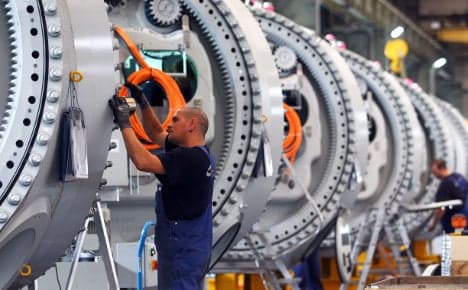German economic growth will remain constant or speed up in 2018: analysts

Analysts said Wednesday that Europe's largest economy Germany will likely maintain or pick up its pace of growth this year, after booking a 0.6-percent expansion between October and December.
"In 2017, all planets were aligned" for the German economy, Florian Hense of Berenberg bank said, even as a tricky September election made for months of political horse-trading in Berlin that has yet to produce a stable government.
The fourth-quarter figure follows up growth of 0.9 percent in the first three months of 2017, 0.6 percent in the second, and 0.7 percent in the third - all adjusted for price, seasonal and calendar effects.
Combined, the quarterly results add up to 2.2-percent expansion over the full year, the fastest rate since 2011.
Wednesday's data confirmed a preliminary estimate of full-year growth Destatis released in January.
The final three months of the year saw exports contribute more strongly to growth than they had between July and September.
Meanwhile, private consumption remained roughly flat quarter-on-quarter, while government spending increased.
Investments in capital goods increased, while construction spending fell back.
"Looking ahead, the same fundamentals which have supported growth in 2016 and 2017 should still be in place" this year, economist Carsten Brzeski of ING Diba bank said, pointing to low interest rates, a strong labour market and a synchronised upturn across the 19-nation eurozone.
"The economy could continue at its current pace for at least one or two more years without showing signs of overheating," he added.
Germany's economy ministry in January forecast slightly faster expansion of 2.4 percent this year.
Private-sector analysts like those at Berenberg or Commerzbank dangle the prospect of even faster growth of 2.5 percent or more.
"Leading indicators suggest the economy is likely to hold up the current speed, if not accelerate," Berenberg analyst Hense said.
But the second half of the year will bring a slight slowdown as "supply growth cannot keep up with demand growth", even as businesses hire more workers and invest in increasing production capacity, he added.
Analysts highlighted remaining risks to the stable outlook, including protectionist impulses from President Donald Trump's administration in the United States, increased geopolitical tensions in the eurozone and further afield, and the danger of a domestic political upset.
The centre-left Social Democratic Party has struck a deal to renew its "grand coalition" with Chancellor Angela Merkel's conservatives after both suffered an election battering in September.
Members in the bitterly divided labour movement could still reject the pact in a postal ballot by early March, leaving Merkel with equally unappealing options of a minority government or new elections.
"Following German politics is currently better than binge viewing TV series like 'House of Cards'," Brzeski quipped.
Comments
See Also
"In 2017, all planets were aligned" for the German economy, Florian Hense of Berenberg bank said, even as a tricky September election made for months of political horse-trading in Berlin that has yet to produce a stable government.
The fourth-quarter figure follows up growth of 0.9 percent in the first three months of 2017, 0.6 percent in the second, and 0.7 percent in the third - all adjusted for price, seasonal and calendar effects.
Combined, the quarterly results add up to 2.2-percent expansion over the full year, the fastest rate since 2011.
Wednesday's data confirmed a preliminary estimate of full-year growth Destatis released in January.
The final three months of the year saw exports contribute more strongly to growth than they had between July and September.
Meanwhile, private consumption remained roughly flat quarter-on-quarter, while government spending increased.
Investments in capital goods increased, while construction spending fell back.
"Looking ahead, the same fundamentals which have supported growth in 2016 and 2017 should still be in place" this year, economist Carsten Brzeski of ING Diba bank said, pointing to low interest rates, a strong labour market and a synchronised upturn across the 19-nation eurozone.
"The economy could continue at its current pace for at least one or two more years without showing signs of overheating," he added.
Germany's economy ministry in January forecast slightly faster expansion of 2.4 percent this year.
Private-sector analysts like those at Berenberg or Commerzbank dangle the prospect of even faster growth of 2.5 percent or more.
"Leading indicators suggest the economy is likely to hold up the current speed, if not accelerate," Berenberg analyst Hense said.
But the second half of the year will bring a slight slowdown as "supply growth cannot keep up with demand growth", even as businesses hire more workers and invest in increasing production capacity, he added.
Analysts highlighted remaining risks to the stable outlook, including protectionist impulses from President Donald Trump's administration in the United States, increased geopolitical tensions in the eurozone and further afield, and the danger of a domestic political upset.
The centre-left Social Democratic Party has struck a deal to renew its "grand coalition" with Chancellor Angela Merkel's conservatives after both suffered an election battering in September.
Members in the bitterly divided labour movement could still reject the pact in a postal ballot by early March, leaving Merkel with equally unappealing options of a minority government or new elections.
"Following German politics is currently better than binge viewing TV series like 'House of Cards'," Brzeski quipped.
Join the conversation in our comments section below. Share your own views and experience and if you have a question or suggestion for our journalists then email us at [email protected].
Please keep comments civil, constructive and on topic – and make sure to read our terms of use before getting involved.
Please log in here to leave a comment.